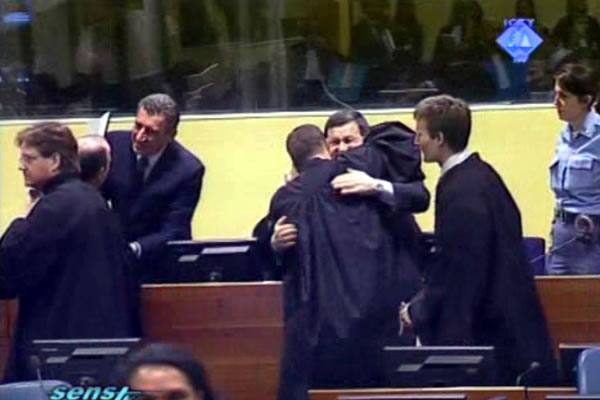Home
JUDGES DIVIDED, GOTOVINA AND MARKAC WALK FREE
The five judges in the Appeals Chamber rendered the final judgment today in the Gotovina and Markac case, voting three to two to quash the Trial Chamber’s verdict on unlawful artillery attacks on the Krajina towns as the main cause of the deportation of the Serb civilians during and after Operation Storm, concluding that the joint criminal enterprise to permanently remove Serbs from Krajina did not exist
 Ante Gotovina and Mladen Markac
Ante Gotovina and Mladen Markac Judges Theodor Meron, Patrick Robinson and Mehmet Guney decided to quash the findings of the trial judgment that there was a joint criminal enterprise whose aim was to permanently remove Serb civilians from Krajina during and after Operation Storm in the summer of 1995; the remaining two judges in the Appeals Chamber, Fausto Pocar and Carmel Agius, dissented. The judges from the USA, Jamaica and Turkey found themselves at odds with their colleagues from Italy and Malta and acquitted the two accused on all counts in the indictment.
The majority in the Appeals Chamber quashed the Trial Chamber’s finding about the unlawfulness of the artillery attacks on Knin, Obrovac, Benkovac and Gracac; they found the trial judges erred when they applied the 200 meter standard, whereby all impact sites located more than 200 meters away from the military targets may be considered as unlawful attacks on civilians. Furthermore, the majority considers, in line with the arguments put forward by the defense, that the unlawful artillery attacks were central to the conclusion about the existence of a joint criminal enterprise whose aim was to remove Serbs; the Appeals Chamber did not analyze whether any other elements, such as the Brijuni transcript, the crimes committed in Operation Storm apart from the artillery attack and the effort to prevent the Serbs from returning may have led to the conclusion that there was the purpose to expel the Krajina people from Croatia.
Since the trial judgment found generals Gotovina and Markac guilty of participation in the joint criminal enterprise, they were today acquitted of all charges on the basis of individual responsibility for the crimes in Krajina. The Appeals Chamber then considered whether they could be acquitted based on the alternative mode of liability, command responsibility, for their failure to prevent crimes and punish the perpetrators. The judges considered that the jurisprudence gave them the power to consider this issue, despite the defense’s opposition.
The Appeals Chamber found, however, that the trial judgment did not contain enough facts to indicate that Gotovina as the commander of Operation Storm had failed to take reasonable measures to control his soldiers. The judges also concluded that the Trial Chamber did not quote evidence to support the finding that Markac, as the special police commander, had effective control over his special police. The Appeals Chamber therefore decided that there was no basis to consider their command responsibility. An additional reason was the fact that the prosecution had not filed any appeals in this respect. The judges were again divided, with Judge Agius appending a separate opinion.
The Appeals Chamber thus quashed with a majority of votes the conviction and the prison sentences for the two generals; Ante Gotovina had been sentenced to 24 and Mladen Markac to 18 years in prison. The judges ordered their immediate release from the UN Detention Unit. Gotovina has spent almost seven years, and Markac about five and a half years in detention.
The judgment was attended by a large number of fans of the two Croatian generals. When the judges said they were to be set free, applause broke out and there were shouts of glee from the packed public gallery. Soon afterwards, the defense teams of the two generals spoke to the media with triumphant statements. One of them went as far as to call for the dismissal of the Dutch judge Alphons Orie, whose judgment was reversed today. The prosecution refrained from comments, noting that they wanted to first study the judgment, the dissenting opinions appended by two judges, and separate opinions of judges Meron and Robinson.
Linked Reports
- Case : Gotovina et al. - "Operation Storm"
- 2012-11-02 GOTOVINA AND MARKAC FINAL JUDGMENT SLATED FOR 16 NOVEMBER 2012
- 2012-09-18 GOTOVINA AND MARKAC BACK IN COURT FOR A SHORT TIME
- 2012-09-04 NEITHER INDIVIDUAL NOR COMMAND LIABILITY FOR GOTOVINA AND MARKAC
- 2012-11-19 MINORITY CRITICIZES MAJORITY
- 2012-11-20 OPEN QUESTION ABOUT INTENTIONS
- 2012-11-21 MUST IT BE "EXPLICIT" WHEN IT IS "OBVIOUS"?
